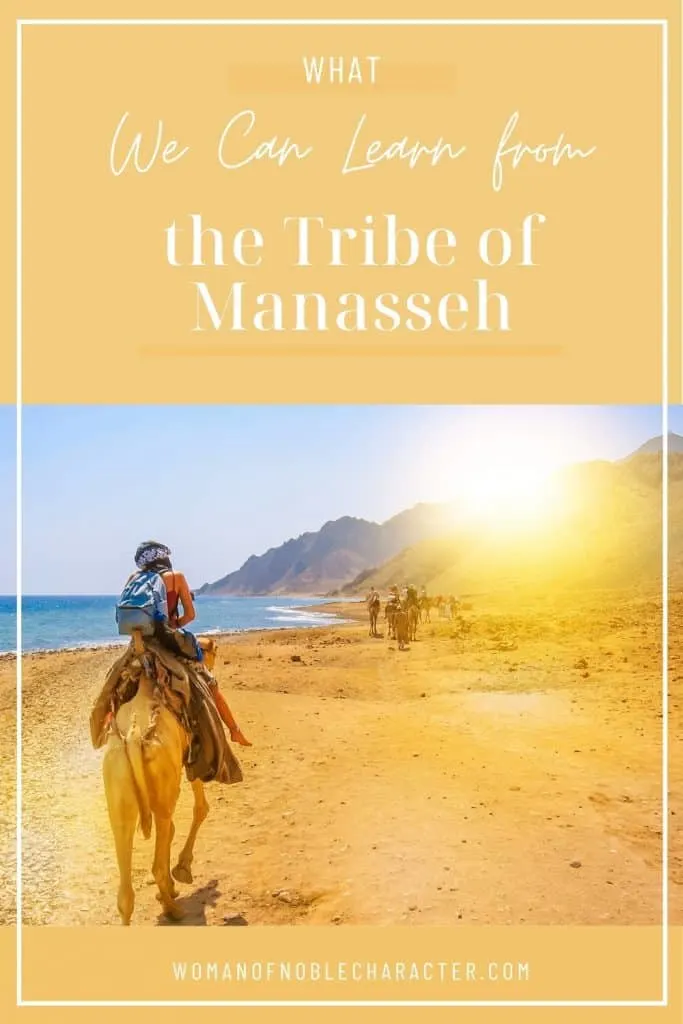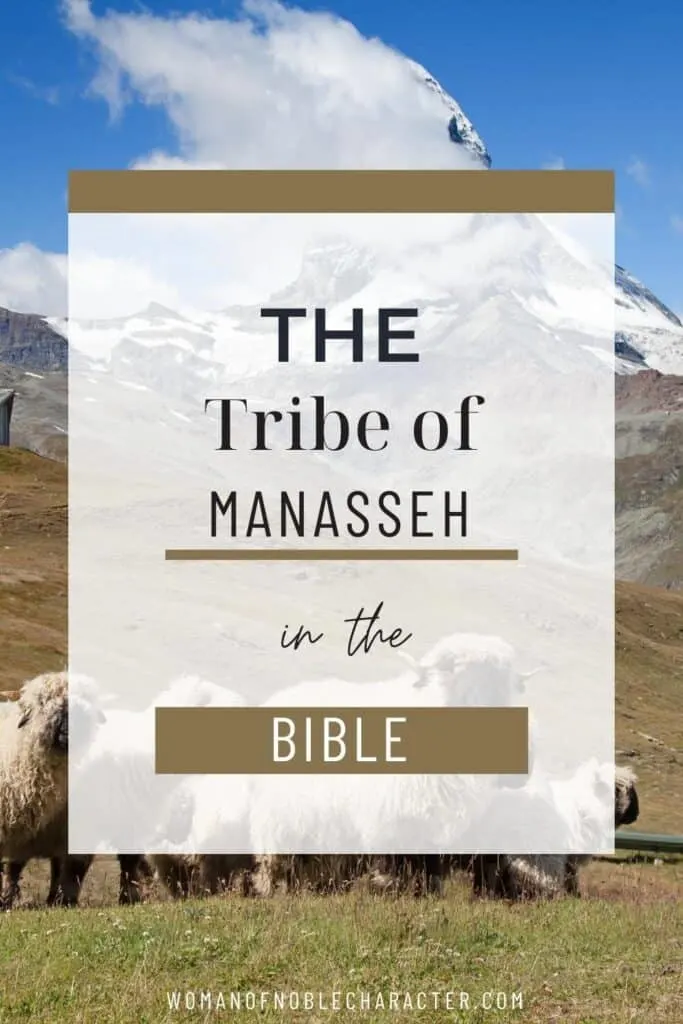This page/post may contain affiliate links. As an Amazon Associate, as well as an affiliate of other programs, this means if you purchase something using these links, I will receive a commission on qualifying purchases at no cost to you! For more detailed information, please visit our Affiliate Disclaimer page
Who Was Manasseh in the Bible?
Manasseh was the older son of Joseph and Asenath, daughter of Potiphera (priest of the sun god Re of Heliopolis).
Joseph called the name of the firstborn Manasseh. “For,” he said, “God has made me forget all my hardship and all my father’s house.” – Genesis 41:51 (ESV)
Years later, Manasseh is adopted by Joseph’s father, Jacob (Genesis 48:5). Joseph’s firstborn son is the forefather of one of the Israelite tribes.
Manasseh in Hebrew: מְנַשֶּׁה, the transliteration is: Menashsheh. The meaning of his name is “who makes to forget” or “causing to forget” or “God hath made me forget.”
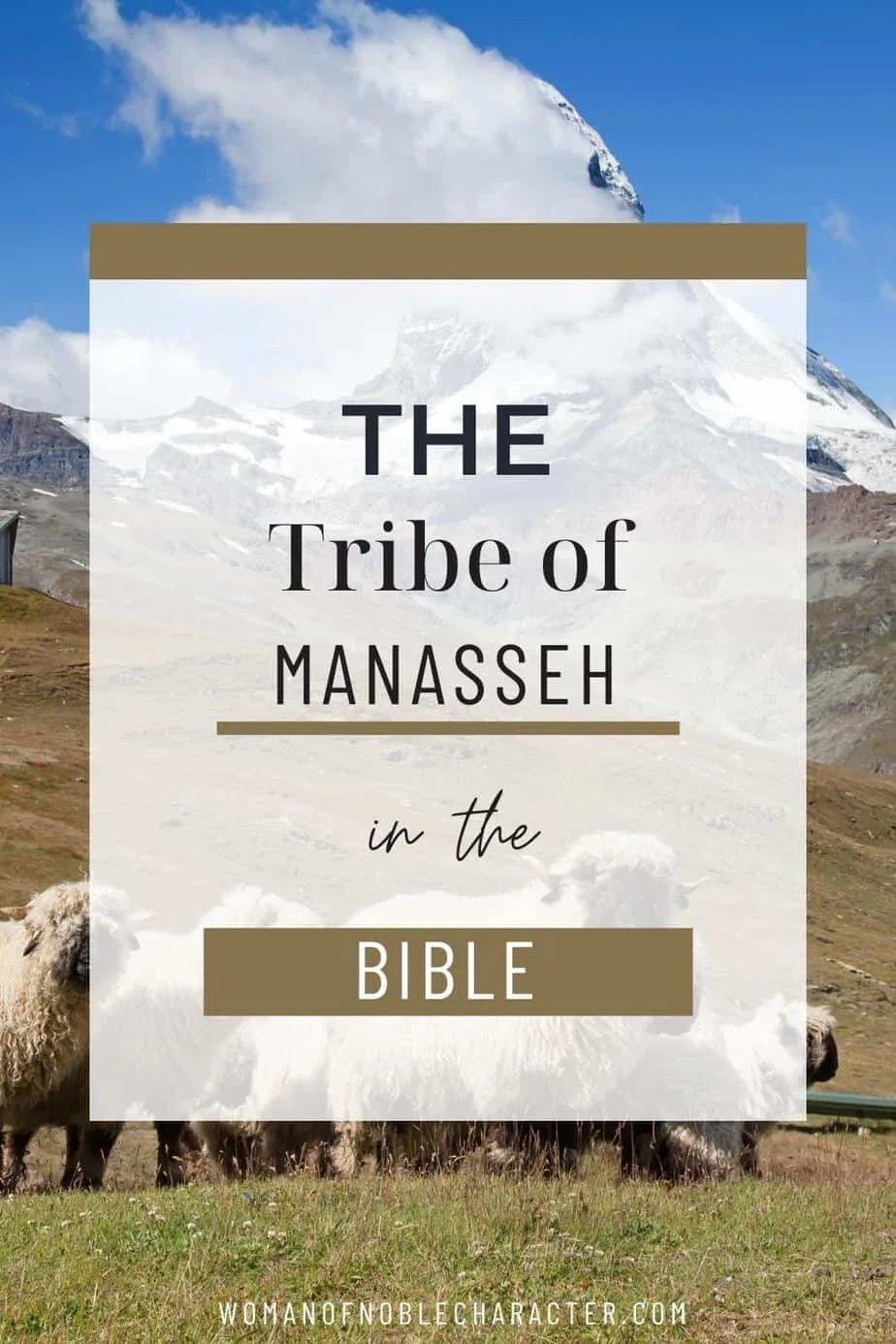
Manasseh is the ancestor of the Tribe of Manasseh. The tribe grows much more significant between the Exodus and Entering the Promised Land. So large that Moses ends up dividing the tribe into two half-tribes.
It was associated with the Tribe of Ephraim and Benjamin during the wanderings in the wilderness. They encamped on the west side of the Holy Tabernacle.
those listed of the tribe of Manasseh were 32,200.
Numbers 1:35 (ESV)
These are the clans of Manasseh, and those listed were 52,700.
Numbers 26:34 (ESV)
And Moses gave to them, to the people of Gad and to the people of Reuben and to the half-tribe of Manasseh, the son of Joseph, the kingdom of Sihon king of the Amorites and the kingdom of Og king of Bashan, the land and its cities with their territories, the cities of the land throughout the country.
Numbers 32:33 (ESV)
The members of the Tribe of Manasseh are called Manassites.
Prophecy in the book of Revelation
Revelation 7:4–8 mentions that an angel of God will seal people from the 12 tribes of Israel. Godly descendants of Manasseh will be a part of the 144-thousand Israelite evangelists for Christ during The Great Tribulation.
And I heard the number of those who were sealed. One hundred and forty-four thousand of all the tribes of the children of Israel were sealed:
Revelation 7:4–8 (ESV) Emphasis mine.
of the tribe of Judah twelve thousand were sealed;
of the tribe of Reuben twelve thousand were sealed;
of the tribe of Gad twelve thousand were sealed;
of the tribe of Asher twelve thousand were sealed;
of the tribe of Naphtali twelve thousand were sealed;
of the tribe of Manasseh twelve thousand were sealed;
of tribe of Simeon twelve thousand were sealed;
of the tribe of Levi twelve thousand were sealed;
of the tribe of Issachar twelve thousand were sealed;
of the tribe of Zebulun twelve thousand were sealed;
of the tribe of Joseph twelve thousand were sealed;
of the tribe of Benjamin twelve thousand were sealed.
In Revelation 7:1-8, Manasseh is mentioned as one of the tribes receiving the Seal of God for 12,000 of its members.
Territory of the Tribe of Manasseh
The half of this tribe, along with Reuben and Gad, had their territory assigned to them by Moses on the east of the Jordan, but it was left for Joshua to define the limits of each tribe.
Now therefore divide this land for an inheritance to the nine tribes and half the tribe of Manasseh.”
With the other half of the tribe of Manasseh, the Reubenites and the Gadites received their inheritance, which Moses gave them, beyond the Jordan eastward, as Moses the servant of the Lord gave them: from Aroer, which is on the edge of the Valley of the Arnon, and the city that is in the middle of the valley, and all the tableland of Medeba as far as Dibon;
Joshua 13:7-12 (ESV)
and all the cities of Sihon king of the Amorites, who reigned in Heshbon, as far as the boundary of the Ammonites; and Gilead, and the region of the Geshurites and Maacathites, and all Mount Hermon, and all Bashan to Salecah; all the kingdom of Og in Bashan, who reigned in Ashtaroth and in Edrei (he alone was left of the remnant of the Rephaim); these Moses had struck and driven out.
The approximate location and boundaries of the 12 landed Israelite tribes are based on records in the Book of Joshua. This, and more, was The Promised Land given by God to the descendants of Israel, the grandson of Abraham. The full extent of the Canaanite land promised was never acquired, due to the repeated disobedience of the Israelites during their commanded conquest of this very idolatrous, heathen land, after the Exodus from slavery in Egypt and the following 40 years of Divine punishment wandering in the wilderness, before Joshua and the living descendants were allowed to enter the land, following the death of Moses.
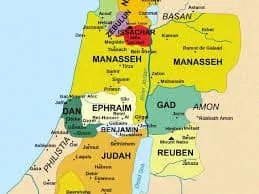
This territory on the east of Jordan was more valuable and of a more significant extent than all that was allotted to the nine and a half tribes in the land of Canaan. It is sometimes called “the land of Gilead” and is also spoken of as “on the other side of Jordan.” The portion given to the half-tribe of Manasseh was the largest on the east of Jordan. It embraced the whole of Bashan. It was bounded on the south by Mahanaim and extended north to the foot of Lebanon. Argob, with its 60 cities, that “ocean of basaltic rocks and boulders tossed about in the wildest confusion,” lay amid this territory.
The whole “land of Gilead” having been conquered, the two and a half tribes left their wives and families in the fortified cities there, accompanied the other tribes across the Jordan, and took part with them in the wars of conquest. The allotment of the land was completed, Joshua dismissed the two and a half tribes, commending them for their heroic service (Joshua 22:1-34). Thus dismissed, they returned over Jordan to their inheritance.
On the west of Jordan, the other half of the tribe of Manasseh was associated with Ephraim, and they had their portion in the very center of Israel, an area of about 1,300 square miles, the most valuable part of the whole country, abounding in springs of water. Manasseh’s portion was immediately to the north of Ephraim’s (Joshua 16). So, the western Manasseh defended the passes of Esdraelon as the eastern kept the passes of the Hauran.
The tribe was associated with the Tribe of Ephraim and Benjamin during the wanderings in the wilderness. They encamped on the west side of the tabernacle.
Blessings of Manasseh in the Bible
Joseph brought his two sons to their grandfather. Manasseh, the older son, was placed at the right hand of Jacob too, as was customary, receive the better blessing. Ephraim was placed on Jacob’s left. But instead of blessing Ephraim with his left hand and Manasseh with his right one, Jacob crossed his arms and gave Ephraim the better blessing.
When Jacob blessed his grandsons Manasseh and Ephraim, he gave the preferred treatment to Ephraim instead of the older brother Manasseh, explaining that Ephraim would become more significant than Manasseh. Before his death, Jacob adopted his grandchildren Manasseh and Ephraim to be equal with his sons.
And now your two sons, who were born to you in the land of Egypt before I came to you in Egypt, are mine; Ephraim and Manasseh shall be mine, as Reuben and Simeon are.
Genesis 48:5 (ESV)
We later read that Joseph became upset with his father because he had violated the custom of giving a better blessing to the older son. It was not expected that the younger child should get a better blessing. However, though this act was not the custom of the day, giving the better blessing to the one men would not choose to bless is the standard practice of God. We see this in other books of the Bible – after all, Jacob was selected over his older brother Esau. And, even more impressive, that Jesus was simply a poor carpenter’s son?
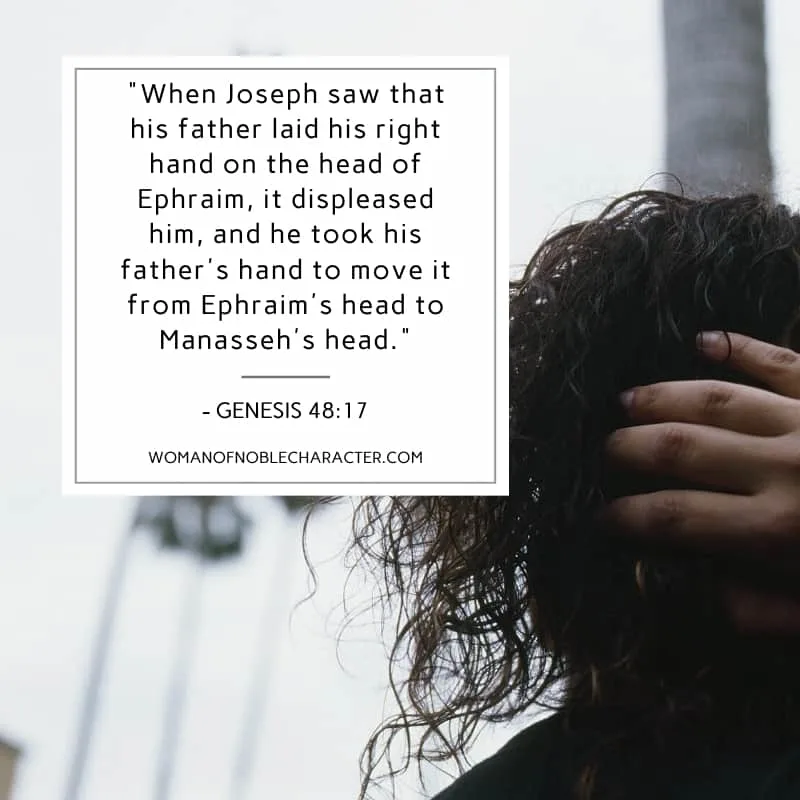
When Joseph saw that his father laid his right hand on the head of Ephraim, it displeased him, and he took his father’s hand to move it from Ephraim’s head to Manasseh’s head.
Genesis 48:17 (ESV)
True persevering faith knows that God will often choose the least to do the greatest. In Hebrews 11:21, we read that those with true faith continue to worship God even at the end of life.
Jacob did not only bless his grandsons, but he also bowed “in worship over the head of his staff.” At the end of Jacob’s life, this worship reflects his journey, which, though he was not necessarily of the best character at first, became known for his attitude of worship.
Moses’ blessing of Manasseh was brief and rather undescriptive:
In majesty he is like a firstborn bull;
Deuteronomy 33:17 (ESV)
his horns are the horns of a wild ox.
With them he will gore the nations,
even those at the ends of the earth.
Such are the ten thousands of Ephraim;
such are the thousands of Manasseh.”
The Famous and Infamous of Manasseh
The most famous descendant of the second half-tribe of Manasseh is Gideon.
And he said to him, “Please, Lord, how can I save Israel? Behold, my clan is the weakest in Manasseh, and I am the least in my father’s house.”
Judges 6:15
Unrelated to Manasseh, son of Joseph and Jacob, one of King David’s descendants is Manasseh. Without question, Manasseh is Judah’s most wicked king. Nothing could stop the inevitable and devastating effects of King Manasseh’s decades of wickedness (2 Kings 20:21–21:18, 2 Chronicles 33:1-11, 2 Kings 21:20, 23:26, and 24:3 and Jeremiah 15:4)
To everyone’s shock, King Manasseh repents, God restores him, and he leads a great revival.
And when he was in distress, he entreated the favor of the Lord his God and humbled himself greatly before the God of his fathers. He prayed to him, and God was moved by his entreaty and heard his plea and brought him again to Jerusalem into his kingdom. Then Manasseh knew that the Lord was God.
2 Chronicles 33:12-20
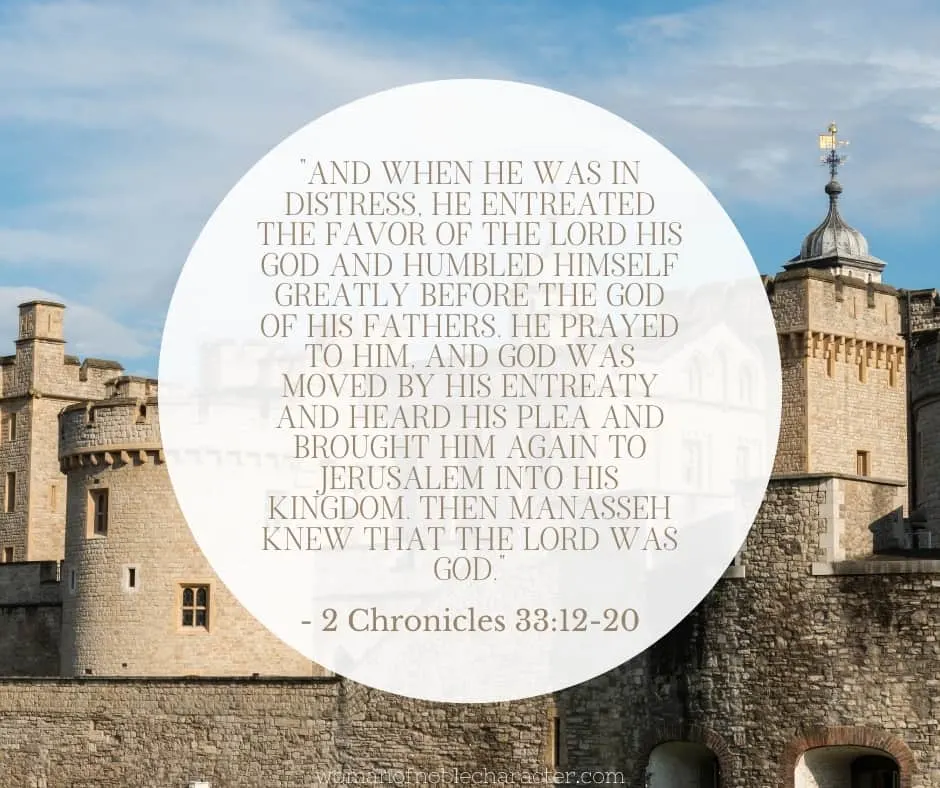
The biggest shock of all? The most famous descendant of King Manasseh is Jesus.
What we can learn from the Tribe of Manasseh
This tribe provides us with many lessons; most importantly, in my estimation, are the lessons about free will, obedience, faith, and the nature of God.
1) God gives us the freedom to choose
Early on, we learn that Manasseh is frequently referred to as the “half-tribe” of Manasseh. This designation highlights the choice made by some of the tribes to reside east of the River Jordan. They believed the Transjordan was the more suitable land to raise their flocks. The rest of the tribe settled west of the Jordan, in Canaan, following Joshua’s command to enter and possess the Promised Land. As is evident throughout Scripture, God endows His children with the freedom to choose.
Exercising free will can lead to undesirable or even disastrous results, especially if we disobey God or make selfish choices. Manasseh learned this lesson—painfully—when they failed to obey God’s command to destroy the Canaanites. Part of this failure was due to a lack of faith that God would give them strength to overcome a seemingly unconquerable foe. Manasseh illustrates other human failings as well, such as greed and covetousness. The (half) tribe of Manasseh desired more land because they were “a numerous people.” They may have had the numbers, but they were unwilling to follow Joshua’s exhortation to clear “the land of the Perizzites and Rephaites.”
Yet the Manassites could not occupy these towns, for the Canaanites were determined to live in that region. However, when the Israelites grew stronger, they subjected the Canaanites to forced labor but ultimately did not drive them out.
The people of Joseph said to Joshua, “Why have you given us only one allotment and one portion for an inheritance? We are a numerous people, and the Lord has blessed us abundantly.”
Joshua 17:12-18 (ESV)
“If you are so numerous,” Joshua answered, “and if the hill country of Ephraim is too small for you, go up into the forest and clear land for yourselves there in the land of the Perizzites and Rephaites.”
The people of Joseph replied, “The hill country is not enough for us, and all the Canaanites who live in the plain have chariots fitted with iron, both those in Beth Shan and its settlements and those in the Valley of Jezreel.”
But Joshua said to the tribes of Joseph—to Ephraim and Manasseh—“You are numerous and very powerful. You will have not only one allotment but the forested hill country as well. Clear it, and its farthest limits will be yours; though the Canaanites have chariots fitted with iron and though they are strong, you can drive them out.”
2) When we are faithful, God reward notices
On the other hand, the tribe of Manasseh at times exhibits faithfulness to God. Gideon, who would later become one of Israel’s best judges, questioned God when called to “save Israel out of Midian’s hand.” One of Gideon’s objections was that his “clan is the weakest in Manasseh, and I am the least in my family” (Judges 6:15).
Gideon required proof from God—twice—before he acted (Judges 6:36–40). Once convinced of God’s will, Gideon moved forward with 32,000 troops to conquer the Midianites. But then God told Gideon that he had too many soldiers for the job, and God reduced his corps to a mere 300 men. Following God’s lead, this paltry force routed the enemy. The battle proved God was with Gideon and the half-tribe of Manasseh.
3) God is just
Zelophehad, great-great-grandson of Manasseh, had no sons and died in the desert before entering the Promised Land. His daughters petitioned Moses, asking that the practice of male inheritance be changed so they could receive their deceased father’s property. After consulting with the Lord, Moses agreed and developed rules designed to keep property within a family.
Then drew near the daughters of Zelophehad, the son of Hepher, son of Gilead, son of Machir, son of Manasseh, from the clans of Manasseh, the son of Joseph. The names of his daughters were: Mahlah, Noah, Hoglah, Milcah, and Tirzah. And they stood before Moses and before Eleazar, the priest and before the chiefs and all the congregation, at the entrance of the tent of meeting, saying, “Our father died in the wilderness.
He was not among the company of those who gathered themselves together against the Lord in the company of Korah but died for his sin. And he had no sons. Why should the name of our father be taken away from his clan because he had no son? Give to us a possession among our father’s brothers.”
Moses brought their case before the Lord. And the Lord said to Moses, “The daughters of Zelophehad are right. You shall give them possession of an inheritance among their father’s brothers and transfer the inheritance of their father to them. And you shall speak to the people of Israel, saying, ‘If a man dies and has no son, then you shall transfer his inheritance to his daughter.
Numbers 27:1–11 (ESV)
And if he has no daughter, then you shall give his inheritance to his brothers. And if he has no brothers, then you shall give his inheritance to his father’s brothers. And if his father has no brothers, then you shall give his inheritance to the nearest kinsman of his clan, and he shall possess it. And it shall be for the people of Israel a statute and rule, as the Lord commanded Moses.’”
You may enjoy this video on the Tribe of Manasseh:
You may also enjoy this post about why some biblical scholars believe that the US is where the Tribe of Manasseh migrated to.
Or one of these recommended resources for further study on the Tribe of Manasseh:
The 12 Tribes of Israel (or is it 14?) & Lessons We Can Learn by Susan J Nelson
THE TWELVE TRIBES CHART ACTIVITY BOOK by Nasiyah Israel
Were you familiar with the Tribe of Manasseh or why it was referred to as the half-tribe of Manasseh?
Because He Lives,
Sue
ESV – “Scripture quotations are from The ESV® Bible (The Holy Bible, English Standard Version®), copyright © 2001 by Crossway, a publishing ministry of Good News Publishers. Used by permission. All rights reserved.”

